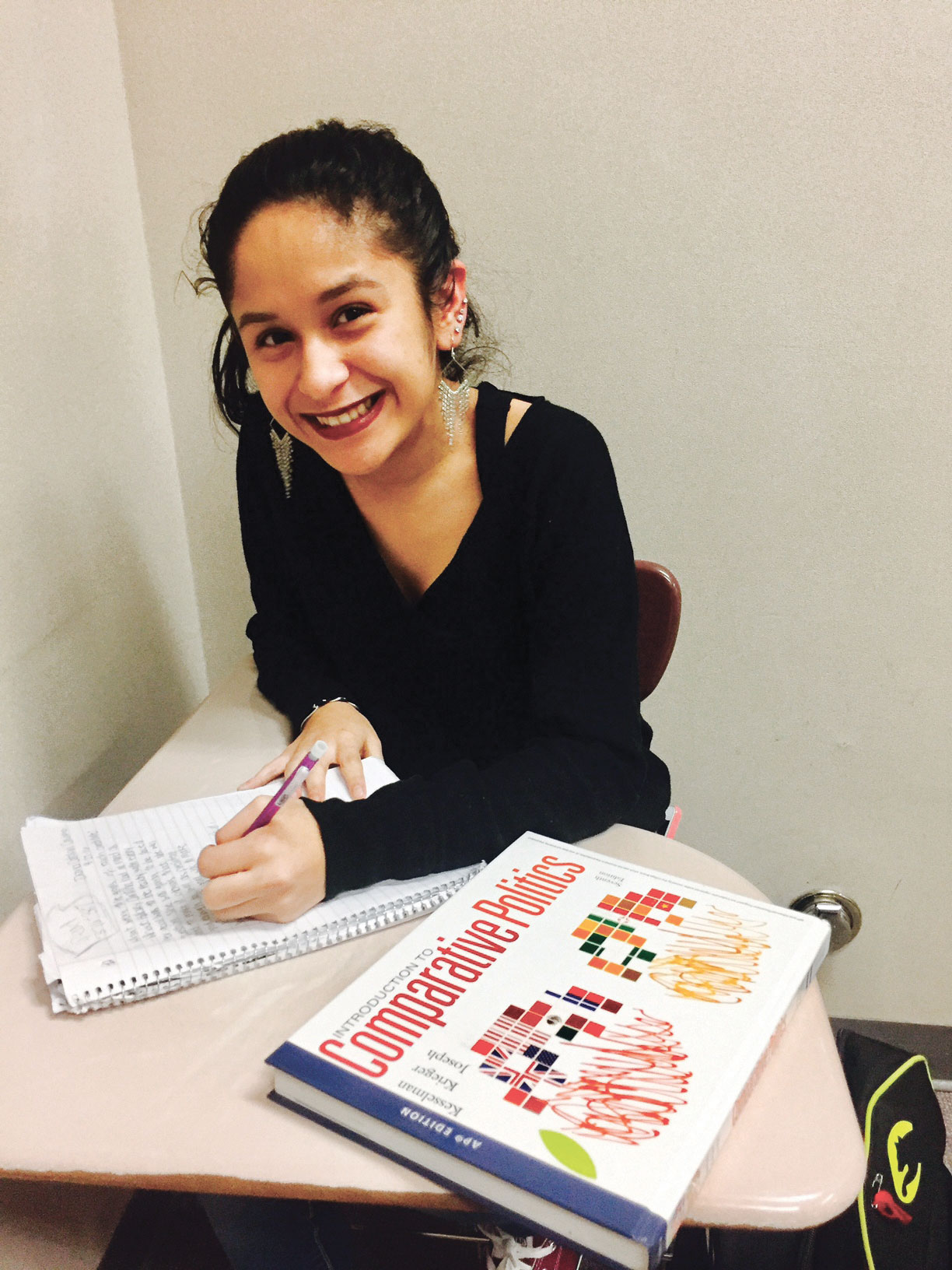[:en]
“I was three when my mom had to come to the U.S because she didn’t have any money,” says 18-year-old Diana Catalan, a DACA student at Omaha South High School. “She was a single mom, she was only 18 and so she didn’t have any money, her plan was to work for some time and come back to Mexico,” she adds.
Catalan says that she was affected by medical problems since the day she was born and her village in Guerrero Mexico didn’t have any good medical care. If services were available, they were too expensive for her mom to be able to afford. “My mom sent money to me so I could come over to the United States, I arrived in Omaha the day after I turned seven,” says Catalan.
According to Catalan her mother said life was better in the United States and although she would have better opportunities in Omaha, the transition proved to be difficult. “The hardest thing about coming to the U.S was having to be with a stranger, my mom was a stranger and I felt like I hated her at that time,” says Catalan, adding “ my uncles told me that she left me and didn’t love me and that’s what I believed.” Catalan says that when her mother left her with her grandparents and immigrated to the United States she was free. “My grandparents had other kids to worry about, I was there and no one would ever notice me, I did whatever I wanted, I wouldn’t even go to school,” explains Catalan. Once in the U.S Catalan says her mom kept a close eye on her and she had to attend school regularly.
Catalan, who currently resides with her mother, stepfather and two younger sisters, says she loves Omaha South High School. “I’m first generation, being in high school is a whole new thing for me because my parents haven’t gone to high school, the road has been a little iffy,” says Catalan.

Catalan points out that during her freshmen year at Omaha South her teachers encouraged her to join clubs and volunteer in the community so she could build her resume. “All I could think about was that I wanted to go to college and I should do that,” she says, adding “I did, I got into clubs, those clubs got us volunteer jobs, I ended up forgetting about the hours and just started to love volunteering.”
Catalan says she has worked with the Omaha Police Department during the holiday season frequently giving out toys to low-income children around Christmas and she also volunteers with them during Halloween where the South Omaha precinct hosts a safe Halloween night for children. “I help give out candy and decorate the precinct,” she says. Catalan says she has also tried her hand at gardening. The teacher that took care of the school garden passed away during her sophomore year and a fellow colleague rounded up students and together have worked in the garden to keep it alive. “It was a new experience for me, it was nice and I really liked it,” says Catalan.
Catalan points out that she also volunteers for a free community health fair. “It’s my favorite because I meet so many people. They tell me their stories and it is so amazing, I get really emotional at times,” says Catalan.
The bright high school student says that it is her top priority to give back to her community because they have been there for her in times of need. “When I was in fourth grade I had a really expensive surgery, my mom put donation boxes at businesses in South Omaha, they explained that we needed financial help because we didn’t have any money. I don’t know how many people donated but we got about $600 dollars and it really helped us,” says Catalan.
“South Omaha is full of poverty and the fact that they are struggling themselves but still have change to give back is amazing,” says Catalan. Since her surgery Catalan has vowed to make her community better because it is her home and the place where her sisters are being raised. “I want the best for them and for my school too. This is my home,” says Catalan.
With plans to attend UNK after her high school graduation, Catalan says it is time for her to create change. “My stepdads side of the family, they were all drinkers and did drugs, their kids have done that too, I want to break that cycle,” says Catalan.
Catalan says that although she has always been a person that has kept things to herself and it has been difficult asking for help she finally started talking to counselors and teachers that are going to help her get into college. “They are the only reason I am going to get into college, I don’t have anyone else to back me up in my family and I know my teachers and counselors are the best,” she says.
Catalan says she wants to represent the immigrant community and break stereotypes of immigrants once she gets to college and encourages others to do the same. “Find the motivation, find something that gets to you. My motivation is my family and my community,” she says.
To read this story in Spanish, click here.
[:es]
“Yo tenía tres años cuando mi mamá tuvo que venir a los Estados Unidos porque no tenía dinero,” dice Diana Catalan, una estudiante de DACA de 18 años de la escuela preparatoria Omaha South. “Mi madre era soltera, tenía sólo 18 años y no tenía dinero, su plan era trabajar por algún tiempo y regresar a México,” dice Catalan.
Catalán dice que se vio afectada por problemas médicos desde el día en que nació y su pueblo en Guerrero México no tenía buen cuidado médico. Si había servicios disponibles, eran demasiado caros para que su madre pudiera pagar. “Mi mamá me envió dinero para que pudiera venir a Estados Unidos, llegué a Omaha al día siguiente de cumplir siete años,” dice Catalán.

Según Catalán su madre dijo que la vida era mejor en los Estados Unidos y aunque tendría mejores oportunidades en Omaha el cambio resultó ser difícil. “Lo más difícil de venir a los Estados Unidos fue tener que estar con una extraña, mi madre era una extraña y sentí que la odiaba en ese momento,” dice Catalán, agregando “mis tíos me dijeron que me dejó y que no me amaba y eso es lo que yo creía.” Catalán dice que cuando su madre la dejó con sus abuelos y emigró a los Estados Unidos ella se sintió libre. “Mis abuelos tenían que preocuparse por otros niños, yo estaba allí y nadie me notaba, hice lo que quería, ni siquiera iba a la escuela,” explica Catalán. Una vez en los Estados Unidos, Catalán dice que su mamá la vigilaba de cerca y que tenía que asistir a la escuela regularmente.
Catalan, que actualmente reside con su madre, padrastro y dos hermanas menores, dice que le encanta la preparatoria Omaha South. “Soy primera generación, estar en la escuela secundaria es algo totalmente nuevo para mí porque mis padres no han ido a la escuela secundaria, el camino ha sido un poco dudoso,” dice el catalán.
Catalán señala que durante su primer año en Omaha South sus profesores la animaron a unirse a clubes y prestar su tiempo al voluntariado en la comunidad para que pudiera construir su currículum. “Todo lo que podía pensar era que quería ir a la universidad y debía hacerlo,” dice ella, agregando “lo hice, entré en clubes, esos clubes nos dieron trabajos voluntarios, terminé olvidándome de las horas y empezó a amar ser voluntaria.”
Catalán dice que ha trabajado con el Departamento de Policía de Omaha durante la temporada navideña con frecuencia regalando juguetes a niños de bajos ingresos y también se ofrece voluntariamente con ellos durante Halloween, donde el distrito de South Omaha alberga una noche segura para los niños. “Yo ayudo a dar dulces y decorar el recinto,” dice Catalan. Ella dice que también ha intentado su mano en la jardinería. La maestra que cuidaba el jardín en nuestra la escuela falleció durante su segundo año y un compañero colega reunió a los estudiantes y juntos han trabajado en el jardín para mantenerlo vivo. “Fue una experiencia nueva para mí, fue agradable y me gustó mucho,” dice Catalán.
Catalán destaca que también se ofrece voluntariamente para una feria de salud comunitaria gratuita. “Es mi evento favorito porque conozco a tanta gente nueva. Me cuentan sus historias y es increíble, me emocionan a veces,” dice Catalán.
La estudiante brillante de secundaria dice que es su máxima prioridad darle a su comunidad porque han estado allí para ella en momentos de necesidad. “Cuando estaba en cuarto grado tuve una cirugía muy cara, mi mamá puso cajas de donación en negocios en el sur de Omaha, explicamos que necesitábamos ayuda financiera porque no teníamos dinero. No sé cuánta gente donó, pero conseguimos unos $ 600 dólares y realmente nos ayudó,” dice Catalán.
“El sur de Omaha está lleno de pobreza y el hecho de que están luchando por sí mismos, pero todavía tienen dinero para donar es increíble,” dice Catalán. Desde su cirugía Catalán ha prometido hacer su comunidad un lugar mejor porque es su hogar y el lugar donde sus hermanas se están criando. “Quiero lo mejor para ellos y para mi escuela también, esta es mi casa,” dice la estudiante.
Con planes de asistir a UNK después de su graduación de la escuela secundaria, Catalán dice que es hora de que ella cree el cambio. “En la familia de mi padrastro, muchos son bebedores y hacen drogas, sus hijos también lo han hecho, quiero romper eso ciclo,” dice Catalán.
Catalán dice que aunque siempre ha sido una persona que se ha mantenido las cosas para sí misma y ha sido difícil pedir ayuda, finalmente comenzó a hablar con consejeros y profesores que van a ayudarla a entrar en la universidad. “Ellos son la única razón por la que voy a entrar en la universidad, no tengo a nadie que me respalde en mi familia y sé que mis maestros y consejeros son los mejores,” dice la estudiante.
Catalán dice que quiere representar a la comunidad de inmigrantes y romper estereotipos de inmigrantes una vez que llegue a la universidad y anima a otros a hacer lo mismo. “Encuentre la motivación, encuentre algo que le llegue, mi motivación es mi familia y mi comunidad,” ella añade.
Disculpa, pero esta entrada está disponible sólo en Inglés Estadounidense.
[:]




